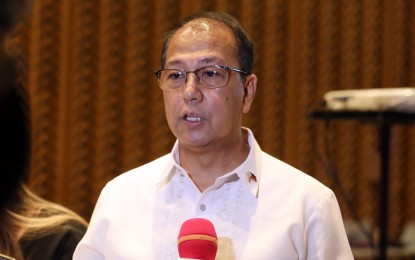
OPAPRU chief Secretary Carlito Galvez Jr. (File photo)
MANILA – Office of the Presidential Adviser on Peace, Reconciliation and Unity (OPAPRU) chief, Secretary Carlito Galvez Jr. said peace education is not only learning about propagating a culture of peace but also includes having the right information and mindset on how to defuse violence.
He added that having these attributes or skill sets will allow one to "defuse, if not, prevent situations of violence and conflict.”
“Peace education approaches should aim to go beyond curriculum development and must be geared towards building particular competencies, values, and practices that can be effectively applied outside the classroom,” Galvez said in his speech on the First National Peace Education Summit held in Davao City held from Sept. 26 to 27.
The two-day First National Peace Education Summit, organized by the OPAPRU in coordination with the Department of Education (DepEd) and Commission on Higher Education (CHED), and with support from Ateneo de Davao University and Mindanao State University, aims to facilitate a more robust peace constituency-building interventions through partnerships and network-building and gather recommendations to strengthen the implementation of peace education in the country.
Around 100 participants attended the two-day meeting with the occasion falling on the same day that the executive fiat was signed 16 years ago.
The OPAPRU chief also said that academic institutions play an instrumental role in promoting the culture of peace, as they can help in “weeding out violence, hazing, and bullying, especially in the formative years of young learners.”
Galvez said promoting peace education in the formal educational setting will require peace stakeholders to develop a creative, inclusive, innovative, holistic, and comprehensive strategy wherein no one should be left behind and everyone is part of the peacebuilding process.
“Let us give deeper meaning to peace education and its desired outcome of molding children to embody interfaith and cultural understanding, tolerance, harmony, and service throughout their lifetime. Peace education is vital in providing spaces to generate important lessons on negotiations, mediation, conflict resolution, fraternity, common good, justice and unity,” he added.
“Most importantly, peace education is a potent strategy in honing the minds, hearts and spirits of future peacemakers on the art of imbibing non-violent approaches towards the ultimate goal of mainstreaming the culture of peace in the country,” he added.
Issued in 2006, Executive Order (EO) No. 570 titled “Institutionalizing Peace Education in Basic Education and Teacher Education” started the implementation of peace education activities in academic institutions throughout the country.
Since the issuance of EO 570, the OPAPRU began efforts to mainstream peace education in the country’s education curriculum. However, these initiatives were not sustained, as the agency’s initiatives were focused on the implementation of peace agreements.
The signing of EO 158 in 2021 titled “Strengthening the Policy Framework on Peace, Reconciliation and Unity and Reorganizing the Government’s Administrative Structure for the Purpose,” put peace education at the core of OPAPRU’s peacebuilding strategies.
With its expanded mandate, the OPAPRU organized a Community of Practice (CoP) for peace education practitioners in November 2021 which became a platform for them to share knowledge and exchange experiences.
During the summit’s plenary session, the OPAPRU presented a proposed strengthened version of Executive Order 570 entitled "Strengthening the Institutionalization of Peace Education Studies in Basic and Higher Education.”
The delegates, both attending physically and online, were divided into groups and were asked to identify gaps in the mainstreaming of peace education in the basic and higher education sectors, as well as provide recommendations on how to address these challenges.
During the deliberations, the participants were provided a set of guide questions – which could be best addressed by the academe -- were integral in further improving the proposed EO strengthening EO 570 and are best addressed by the academe.
The responses of the participants, which were fully documented, were presented before the plenary.
During the deliberations, the clamor to strengthen EO 570 became more apparent, and speaking unanimously, the academe pressed for the institutionalization of Peace Education in the basic and higher education curricula, as well as the establishment of Peace Centers in schools and campuses across the country.
Likewise, alternative sources of funding for the implementation of the proposed EO were discussed.
Further, in affirming the success and progress made during the Summit, the participants called for the annual conduct of the National Peace Education Summit.
The inputs gathered from the deliberations will be consolidated, fine-tuned and incorporated into the proposed strengthened EO. (PNA)
